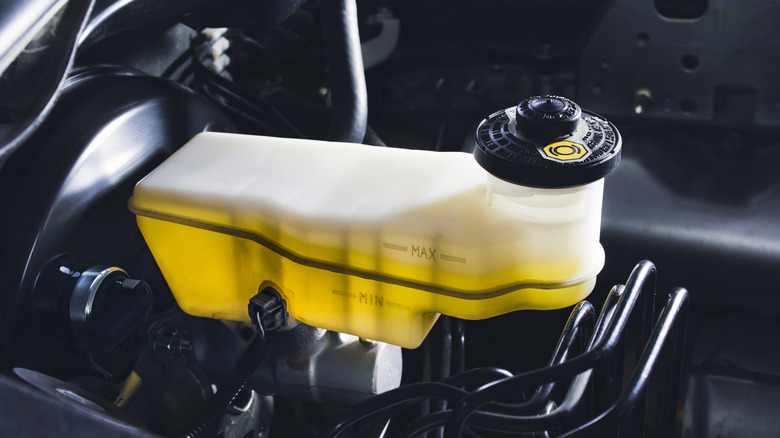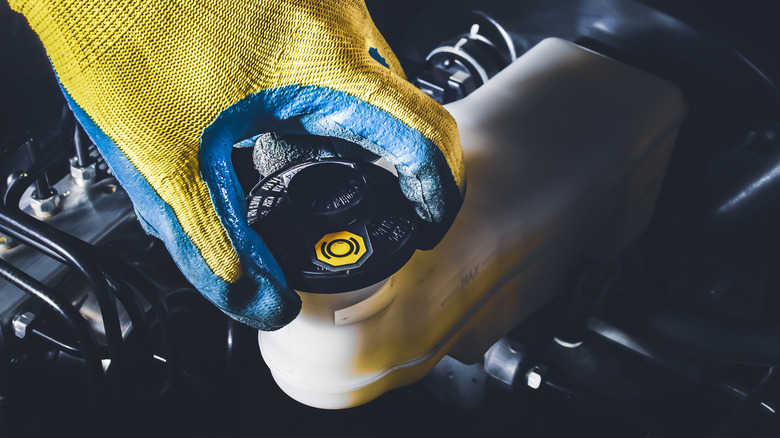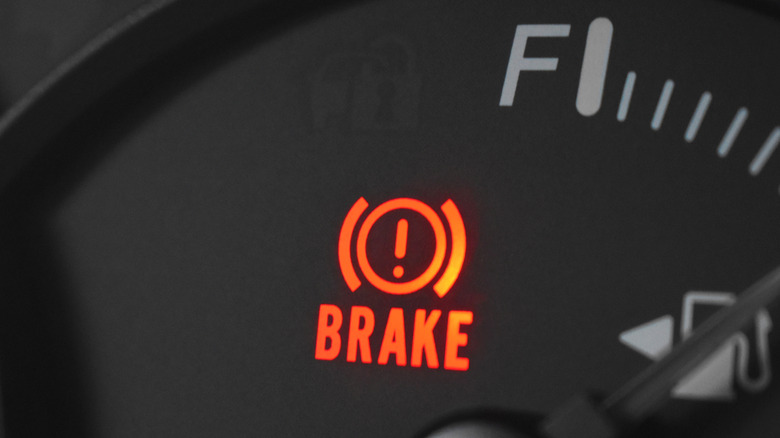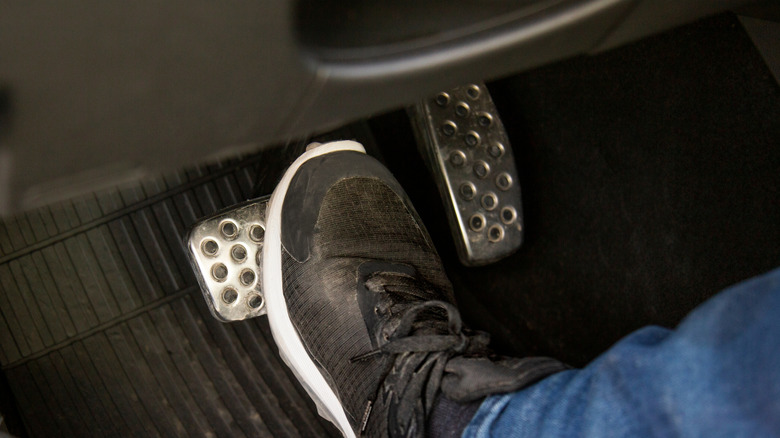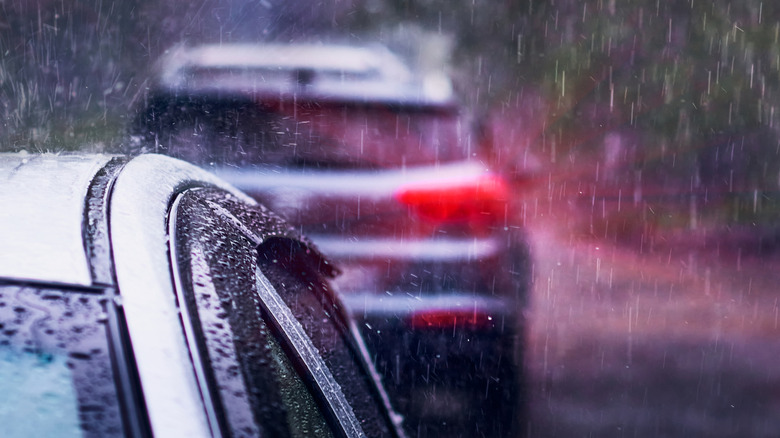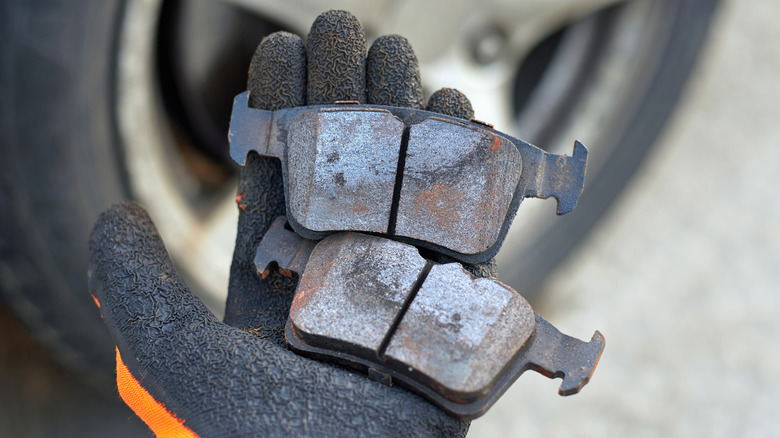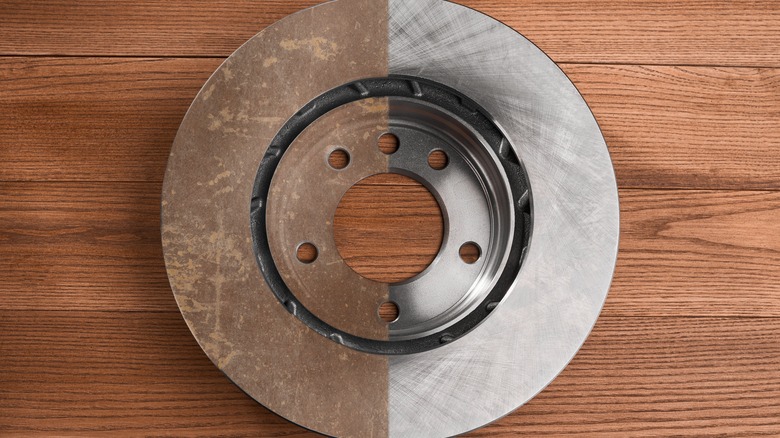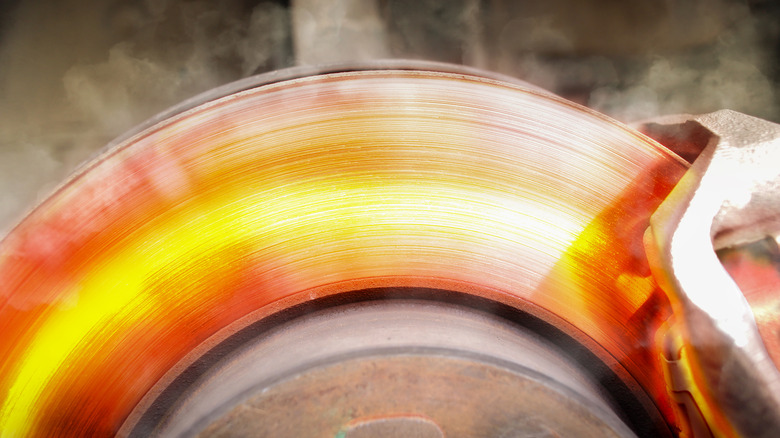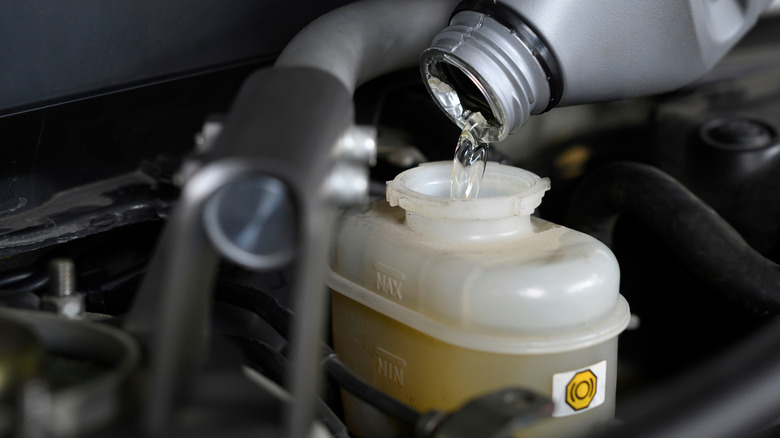7 Signs And Causes Of Low Brake Fluid (And What Happens When You Run Out)
There are many, many fluids your car needs to keep running properly, and much like those in the human body, things can go very badly if you have too much or not enough. Most of these liquids are required to keep the engine and transmission working smoothly, but arguably the fluid most important for your own safety is the stuff that goes into your brakes.
Brake fluid, as with anything, can and will eventually start to get dirty (i.e. brown-ish or black-ish), run low, or run out completely. Also like the rest, it's in everyones' best interest to replace or refill these fluids whenever the situation calls for it. Dirty brake fluid or low levels reduce braking effectiveness, which will make stopping quickly tougher (and therefore more dangerous).
Running out of brake fluid completely is far more dangerous, though, as driving without could make your brakes fail when you need them. It's exceedingly important that you know when your brake fluid is low or empty, and remedy the situation quickly. Fortunately your car has ways of letting you know something might be up. And they're listed below — starting with the most effective ones — because brake trouble is very serious business.
Low fluid levels
By far, the most definitive way to confirm low amounts of brake fluid is to, well, check your brake fluid levels. It's not something you can do while driving, so you'll want to park somewhere safe first, but it's fairly easy to do. With the car stopped and the engine turned off, the first thing you'll want to do is pop open the hood. Then you need to find the master brake cylinder reservoir, which is most often placed towards the back of the engine compartment and roughly in front of where the brake pedal would be.
If you happen to be driving a newer vehicle that uses a translucent reservoir, you should see a mark for "Full" (or similar wording). Fluid levels sitting below that line means it's time to add more. Or, if the reservoir isn't translucent, you'll have to open it up instead. Use a clean cloth or paper towel to wipe off the reservoir cap (so as not to risk dirt or grime falling into the brake fluid) and open the clamp, then remove the cap and check inside the reservoir itself. As before, there will be a line for "Full," and if the fluid is below that line you need to add more.
Also keep an eye out for dirty brake fluid. The color of brake fluid depends on the type your car uses, but if it looks brown or black you'll want to empty it out and replace it with a fresh batch.
Warning lights
One of the simplest ways to see that you might (emphasis on "might") be running low on brake fluid is a warning light appearing on your dashboard. In this particular case, it's most often depicted as a circle with an exclamation mark in either red or orange.
This is just a starting point, however. The brake warning light does indicate a problem with your brakes, but that's just it: It's "a" problem. So you'll still need to verify the cause. It could be something as simple as forgetting to take off the parking brake, a heads-up about brake pads that are wearing out, the onboard computer detecting a problem with the anti-lock braking system, or, of course, brake fluid levels.
Once you can confirm whether or not the light is the result of a forgotten parking brake, you can begin a more thorough process of elimination. Though if that light does stay on when you know the parking brake isn't engaged, it's best to find a spot to pull over and park before further sleuthing. If the cause is a more serious problem like empty fluid reserves or brake system failure, you don't want to be driving.
Braking feels wrong
Not all vehicles brake in the exact same way, so there's room for interpretation with this one. However, if you're familiar with your car's handling and start to notice that braking feels ... "off" in some way ... it might be your fluid levels.
Again, what actually constitutes "off" may vary from vehicle to vehicle, but there are a couple of fairly common tactile sensations you might feel when pushing down the brake pedal. If you feel unexpected resistance, like the pedal doesn't want to push in the way it normally does, your fluid may be dirty, or some contaminants might have gotten into the system. If it feels "mushy," or "spongy," or otherwise like you have to push the pedal further than normal to functionally brake, low fluid level is a probable cause.
In either case, you'll want to find a safe spot to park and take a look at your brake fluid reservoir. Black or brown fluid is dirty and will need to be flushed and replaced, while low levels need to be topped off with the appropriate fluid (typically found printed on the reservoir cap). Clean brake fluid that still looks full means it's likely not the fluid causing these problems, at which point it's best to have a professional take a look.
Taking more time to stop
The movement of the brake pedal might not be any different from what you're used to, but when you're familiar enough with a car you start to grow accustomed to intricacies — such as how long it usually takes to come to a stop at various speeds — and you can sense it. Low brake fluid levels could very well make stopping take longer, which is often referred to as brake fade and is mostly the result of ambient temperatures or intense driving.
Worn out brake pads are the most common issue, and necessitate getting them replaced — preferably with slots built in that allow the gases generated from braking to escape rather than rebuff the pads as they attempt to grip the rotors. Too much moisture seeping in between the pads and rotors can also lead to brake fade when it's particularly damp or humid.
However, internal heat generated by hard braking or hauling heavy loads could cause your brake fluid to boil, which may cause overall fluid levels to drop. Once again, the best way to confirm is to check your brake fluid levels manually. But what's tricky about it is the fact that this "fluid fade" is only one potential cause, and not even the most likely one.
Other brake pad shenanigans
One more potential result of low brake fluid levels is malfunctioning brake pads — though "malfunctioning" might be too strong a word. If you notice that any of your brake pads aren't clamping down when they should be, or see that any pads are wearing down more than others.
Naturally you'll want to be parked in a safe location before attempting to check on either of these things, because attempting to look at or watch your brake pads while also driving your car is practically impossible to do (and super dangerous). But once you're parked, push on the brake pedal and see how far each of your brake pads make it. You'll probably want a second person to help with this, actually. You'll also want to check your brake pads for any uneven wear. Fortunately it is possible to check your brake pads without removing the wheel. However, if you're doing all of this just to see if maybe your brake fluid levels have dropped, it would be much easier to simply pop the hood and look at the reservoir directly.
Of course, there's nothing wrong with performing all of these checks (brake pad wear, evenness, and fluid levels) together. In fact, if you're worried something might be going on with your brakes it's advisable to do so, as ineffective brakes are a very serious matter.
Noises while braking
Much like with how a car feels, there's some wiggle room on how any given car may sound. That said, unless you know for a fact it's by design, hearing your car's brakes squealing or grinding when you push the brake pedal probably means something's going (or gone) wrong.
Irregular brake noises are technically the result of brake pads, not fluid levels, but low fluid absolutely could affect the effectiveness of said brake pads and cascade into something like weird braking noises. Though it's important to note that temporary sounds (i.e. they stop after you've been driving for a bit) are most likely caused by rust or corrosion buildup, which then gets scraped off over time.
In the case of consistent brake noises, however, it's probably best to skip checking your fluid levels and condition yourself and take the vehicle to a garage ASAP instead. If it's not being caused by a lack of lubrication or an abundance of moisture, there's a good chance brake pads themselves are damaged in some way, which is bad.
Smells when braking
We can't forget smells, either. While not as definitive a tell as unexpected sounds, smelling something strange when braking could warrant looking into — sometimes. It really depends on what the smell actually is.
Brake pads smelling like fish, while not ideal (to put it mildly), isn't necessarily cause for alarm. It's an odor that's fairly common when newer brake pads are being broken in, typically being caused by a binding agent that will eventually wear out over time — it'll just burn off in a stinky gas form during the process. A burning rubber smell, on the other hand, could indicate actual trouble — maybe, again, it depends.
That burning odor might be from leaving the parking brake on while driving, a bit too much brake dust around the pads, or ambient smells coming from a completely different vehicle in your vicinity. Or it could point to a worn out brake pad or stuck caliper, which will need to be addressed but aren't strictly an emergency. However, the smell of burning could also be a sign of overheating pads or a brake fluid leak somewhere. If you're not sure of the cause, or suspect a leak or overheating, get your car to a garage ASAP.
What to do if you're low (or empty)
Whether your brake fluid is low or you've completely run out, it's extremely important to get it refilled (or replaced if it's dirty) as soon as possible. Depending on your vehicular know-how and comfort with doing this kind of stuff, you could take care of it yourself for around $10 to $20. It's not a terribly complicated process. Just make sure you're using the right type for your car, and check the reservoir cap for the recommended fluid type.
If you're not comfortable doing it yourself, bring your vehicle into a garage. The added labor (plus the fluid cost) would be more likely to set you back anywhere from $60 to over $100. Regardless, it's a good idea to change your car's brake fluid roughly every two years or 30,000 miles. However, it's also recommended to check fluid levels and cleanliness whenever your car has its brakes serviced or has an oil change.
In the event the fluid loss is the result of a damaged or leaking brake line, it's much the same deal. The hose replacement process isn't too complicated, but you will need to make sure to do it right, flush air out of the system, and replace the fluid. If you opt to bring it in for servicing instead, you can expect to pay between $65 and $380 per hose replacement, depending on whether you're driving a car, truck, or SUV.
